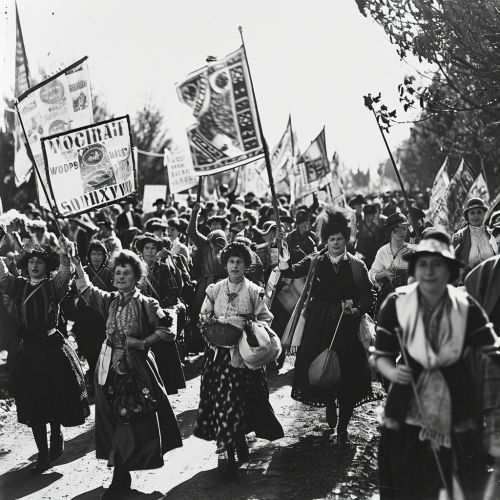Feminism
Origins and Definitions
Feminism is a socio-political movement that advocates for gender equality, with a focus on the rights and status of women. The term "feminism" itself was coined in the 19th century, originating from the French word "féminisme". The movement is divided into several waves, each representing a different era and focus of feminist activism.
First Wave Feminism
The first wave of feminism took place in the late 19th and early 20th centuries, primarily in the United States and the United Kingdom. It was characterized by a focus on legal inequalities, primarily addressing women's suffrage. Key figures during this time included Susan B. Anthony and Elizabeth Cady Stanton, who campaigned for women's right to vote.


Second Wave Feminism
The second wave emerged in the 1960s and lasted until the 1980s. This wave expanded the debate to a wider range of issues: sexuality, family, the workplace, reproductive rights, and legal inequalities. Second wave feminism also drew attention to domestic violence and marital rape issues, establishment of rape crisis and battered women’s shelters, and changes in custody and divorce law.
Third Wave Feminism
The third wave of feminism began in the mid-1990s and is informed by post-colonial and post-modern thinking. It challenged the definitions of femininity that second wave feminism had created and sought to redefine what it meant to be a feminist. This wave has focused on "micro-politics" and challenged the second wave's paradigm as to what is, or is not, good for women.
Fourth Wave Feminism
The fourth wave, from around 2012, has been associated with a focus on the empowerment of women, on body positivity, and on the use of social media to discuss and organize. It has been characterized by a focus on sexual harassment, body shaming, and rape culture, among other issues.
Intersectional Feminism
Intersectional feminism is a branch of feminism that identifies how different aspects of social and political discrimination overlap with gender. It's a concept often used in critical theories to describe the ways in which oppressive institutions (racism, sexism, homophobia, transphobia, ableism, xenophobia, classism, etc.) are interconnected and cannot be examined separately from one another.
Criticisms and Controversies
Feminism as a movement has faced various criticisms and controversies over the years. Some critics argue that feminism does not represent all women, particularly women of color and women from developing countries. Others argue that feminism is anti-men, a claim that most feminists deny, stating that the movement seeks equality, not superiority.
